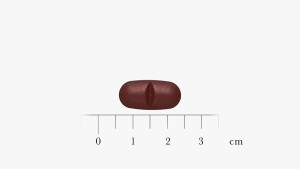
TAPIMIO 250 mg PROLONGED-RELEASE TABLETS


How to use TAPIMIO 250 mg PROLONGED-RELEASE TABLETS
Translated with AI
This page provides general information and does not replace a doctor’s consultation. Always consult a doctor before taking any medication. Seek urgent medical care if symptoms are severe.
Show originalContents of the leaflet
Introduction
Package Leaflet: Information for the User
Tapimio 250 mg prolonged-release tablets EFG
Tapentadol
Read the entire package leaflet carefully before starting to take this medication, as it contains important information for you.
- Keep this package leaflet, as you may need to read it again.
- If you have any questions, consult your doctor or pharmacist.
- This medication has been prescribed to you only, and you should not give it to others, even if they have the same symptoms as you, as it may harm them.
- If you experience side effects, consult your doctor or pharmacist, even if they are not listed in this package leaflet. See section 4.
Package Leaflet Contents
- What is Tapimio and what is it used for
- What you need to know before taking Tapimio
- How to take Tapimio
- Possible side effects
- Storage of Tapimio
- Package Contents and Additional Information
1. What is Tapimio and what is it used for
Tapentadol, the active ingredient of Tapimio, is a potent analgesic belonging to the class of opioids.
Tapimio is used for the treatment of severe chronic pain in adults that can only be adequately treated with an opioid analgesic.
2. What you need to know before taking Tapimio
Do not take Tapimio:
- if you are allergic to tapentadol or any of the other ingredients of this medication (listed in section 6),
- if you have asthma or if your breathing is slow or shallow to dangerous levels (respiratory depression, hypercapnia),
- if you have intestinal paralysis,
- if you have consumed alcohol, sleeping pills, other analgesics, or other psychotropic medications (medications that affect mood and emotions) at high doses (see section "Other medications and Tapimio").
Warnings and Precautions
Consult your doctor or pharmacist before starting to take this medication:
- if your breathing is slow or shallow,
- if you have increased intracranial pressure or altered consciousness up to coma,
- if you have had a head injury or brain tumors,
- if you have liver or kidney disease (see section "How to take Tapimio"),
- if you have a disease of the pancreas or bile ducts, including pancreatitis,
- if you are taking medications called mixed opioid agonist/antagonists (e.g., pentazocine, nalbuphine) or partial agonists of opioid μ receptors (e.g., buprenorphine),
- if you are prone to epilepsy or convulsive seizures, or if you are taking other medications with a known risk of increasing seizures, as the risk of these seizures may increase.
- if you or a family member have a history of substance abuse or dependence on prescription medications or illicit substances ("addiction").
- if you smoke,
- if you have ever had problems with your mood (depression, anxiety, or personality disorder) or have received psychiatric treatment for other mental illnesses.
This medication contains tapentadol, which is an opioid medication. Repeated use of opioid analgesics can reduce the effectiveness of the medication (you may become accustomed to it). It can also lead to dependence and abuse, which can result in a potentially fatal overdose. It is essential to inform your doctor if you think you may have developed dependence on this medication. Its use (even at therapeutic doses) can cause physical dependence, which may lead to withdrawal symptoms and a recurrence of your problems if you stop taking it suddenly.
Tapentadol can cause physical and psychological dependence. If you have a tendency to abuse medications or are dependent on medications, you should only take these tablets for short periods under strict medical supervision.
Respiratory disorders related to sleep
Tapentadol can cause respiratory disorders related to sleep, such as sleep apnea (pauses in breathing during sleep) and sleep-related hypoxemia (low oxygen levels in the blood). Symptoms may include pauses in breathing during sleep, nighttime awakenings due to difficulty breathing, difficulty maintaining sleep, or excessive daytime sleepiness. If you or someone else observes these symptoms, consult your doctor. Your doctor may consider reducing the dose.
Other medications and Tapimio
Inform your doctor or pharmacist if you are taking, have recently taken, or may need to take any other medication.
- The risk of side effects increases if you are taking medications that can cause seizures (attacks), such as certain antidepressants or antipsychotics. The risk of seizures increases if you take this medication simultaneously with these medications. Your doctor will tell you if this medication is suitable for you.
- Concomitant use of tapentadol and sedative medications such as benzodiazepines or related medications (certain sleeping pills or tranquilizers [e.g., barbiturates] or analgesics such as opioids, morphine, and codeine [also as a cough medication], antipsychotics, antihistamines H1, alcohol) increases the risk of drowsiness, respiratory difficulties (respiratory depression), coma, and can be potentially fatal. Due to this, concomitant use should only be considered when other treatment options are not possible.
However, if your doctor prescribes tapentadol with sedative medications, they will limit the dose and duration of concomitant treatment.
The concomitant use of opioids and medications used to treat epilepsy, nerve pain, or anxiety (gabapentin and pregabalin) increases the risk of opioid overdose, respiratory depression, and can be potentially fatal.
Inform your doctor if you are taking gabapentin or pregabalin or any other sedative medication, and follow your doctor's dosage recommendation to the letter.
It may be helpful to inform friends or family members so they are aware of the signs and symptoms mentioned above. Contact your doctor when you experience these symptoms.
- If you are taking a type of medication that affects serotonin levels (e.g., certain medications for treating depression), talk to your doctor before taking this medication, as there have been cases of "serotonin syndrome". Serotonin syndrome is a rare but potentially fatal disorder. Symptoms can include involuntary muscle contractions, agitation, excessive sweating, tremors, exaggerated reflexes, increased muscle tension, and body temperature above 38°C. Your doctor can provide additional information.
- The concomitant administration of tapentadol with other types of medications called mixed opioid agonist/antagonists (e.g., pentazocine, nalbuphine) or partial agonists of opioid μ receptors (e.g., buprenorphine) has not been studied. It is possible that tapentadol may not have the same efficacy if administered with one of these medications. Inform your doctor if you are currently being treated with one of these medications.
- The administration of this medication with potent inhibitors or inducers (e.g., rifampicin, phenobarbital, St. John's Wort) of certain enzymes necessary for the elimination of tapentadol from your body may affect the efficacy of tapentadol or cause side effects, especially when starting or stopping this other type of medication. Keep your doctor informed about all medications you are taking.
- Tapentadol should not be taken with MAO inhibitors (medications for treating depression). Inform your doctor if you are taking MAO inhibitors or if you have taken them in the last 14 days.
Taking Tapimio with food, drinks, and alcohol
Do not consume alcohol while taking this medication, as some of its side effects, such as drowsiness, may increase. Food intake does not affect the effect of this medication.
Pregnancy and breastfeeding
If you are pregnant or breastfeeding, think you may be pregnant, or plan to become pregnant, consult your doctor or pharmacist before using this medication.
Do not take this medication:
- if you are pregnant, unless your doctor has indicated it, as prolonged use of tapentadol during pregnancy may cause withdrawal symptoms in the newborn, which can be life-threatening if not detected and treated by a doctor.
- during breastfeeding, as it may be excreted in breast milk.
The use of tapentadol is not recommended:
- during labor, as it may cause slow or shallow breathing to dangerous levels (respiratory depression) in the newborn.
Driving and using machines
This medication can cause drowsiness, dizziness, and blurred vision and may affect your reactions.
This can occur especially when you start taking tapentadol, when your doctor changes your dose, or when you drink alcohol or take tranquilizers. Ask your doctor if you can drive or use machines.
3. How to take Tapimio
Follow the administration instructions for this medication exactly as indicated by your doctor or pharmacist. If in doubt, consult your doctor or pharmacist again.
Your doctor will adjust the dose based on the intensity of your pain and your personal sensitivity to pain. Generally, you should take the minimum effective dose to relieve pain.
Adults
The recommended starting dose is 50 mg taken twice a day, approximately every 12 hours. Daily doses above 500 mg of tapentadol are not recommended.
Your doctor may prescribe a different dose or dosing regimen, which is more suitable for you if necessary. If you think the effect of these tablets is too strong or too weak, consult your doctor or pharmacist.
Elderly patients
In elderly patients (over 65 years of age), the dose does not usually need to be adjusted. However, the elimination of tapentadol may be delayed and slower in certain patients in this age group. If this applies to you, your doctor may prescribe a different dosing regimen.
Liver and kidney diseases (hepatic and renal insufficiency)
Patient with severe liver problems should not take these tablets. If you have moderate liver problems, your doctor will prescribe a different dosing regimen. In cases of mild liver problems, dose adjustment is not necessary.
Patient with severe kidney problems should not take these tablets. In cases of mild or moderate kidney problems, dose adjustment is not necessary.
Use in children and adolescents
Tapentadol is not indicated in children and adolescents under 18 years of age.
How and when to take Tapentadol
Tapentadol should be taken orally.
Always swallow the tablet with sufficient liquid. Do not chew or crush them, as this could lead to an overdose because the active ingredient will be released in your body too quickly.
You can take the tablets with or without food.
The tablet can be divided into equal doses.
The coating of the tablet may not be completely digested and may appear, apparently unchanged, in the feces. This should not concern you, as the active ingredient of the tablet will have already been absorbed by the body, and what you see is only the empty coating.
Instructions for opening the blister pack
This medication is packaged in child-resistant, perforated unit-dose blisters.
You cannot press the tablets through the blister pack. Follow these instructions for opening the blister pack:
- Tear off a single dose along the perforation line of the blister pack.

- This will give you access to an unscaled area located where the perforation lines intersect.

- Pull the unscaled section to remove the seal from the cover.

How long to take Tapentadol
Do not take the tablets for longer than your doctor has indicated.
If you take more Tapentadol than you should
After taking very high doses, you may experience some of the following effects:
- very small pupils,
- vomiting,
- decreased blood pressure,
- rapid heartbeat,
- fainting, altered consciousness, or coma (deep loss of consciousness),
- seizures,
- slow or shallow breathing to dangerous levels or respiratory arrest.
If you experience any of these effects, you should immediately call a doctor.
In case of overdose or accidental ingestion, consult your doctor or pharmacist immediately or call the Toxicology Information Service, phone: 91 562 04 20, indicating the medication and the amount used. It is recommended to take the package and package leaflet of the medication to the healthcare professional.
If you forget to take Tapimio
If you forget to take a tablet, you will likely feel pain again. Do not take a double dose to make up for forgotten doses, but continue taking the tablets as before.
If you stop taking Tapimio
If you stop or discontinue treatment too early, you will likely feel pain again. If you want to stop treatment, consult your doctor before doing so.
Generally, patients do not experience any side effects after stopping treatment, but in rare cases, people who have taken the tablets for a long time may feel unwell if they stop taking them suddenly.
Symptoms may include:
- restlessness, tearful eyes, runny nose, yawning, sweating, chills, muscle pain, and dilated pupils,
- irritability, anxiety, back pain, joint pain, weakness, abdominal cramps, difficulty sleeping, nausea, loss of appetite, vomiting, diarrhea, and increased blood pressure, respiratory rate, or heart rate.
If you experience any of these symptoms after stopping treatment, consult your doctor.
Do not stop taking this medication abruptly, unless your doctor tells you to do so. If your doctor wants you to stop taking these tablets, they will tell you how to do it, which may involve gradually reducing the dose.
If you have any further questions about the use of this medication, ask your doctor or pharmacist.
4. Possible Adverse Effects
Like all medicines, this medicine can cause adverse effects, although not all people suffer from them.
Adverse effects or important symptoms to be aware of and what to do if you are affected by them:
- This medicine may cause allergic reactions. The symptoms may consist of wheezing (a kind of whistling when breathing), difficulty breathing, inflammation of the eyelids, face, or lips, skin rash, or itching, especially if they affect the whole body.
- Another serious adverse effect is breathing more slowly or more weakly than normal. It occurs mostly in elderly patients or in weakened patients.
If you experience any of these important symptoms, consult your doctor immediately.
Adverse effects that may occur:
Very common(may affect more than 1 in 10 people):
- nausea, constipation,
- dizziness, drowsiness, headache (head pain).
Common(may affect up to 1 in 10 people):
- decreased appetite, anxiety, depression of mood, difficulty sleeping, nervousness, restlessness, attention disorders,
- tremors, muscle twitches,
- hot flashes,
- shortness of breath,
- vomiting, diarrhea, poor digestion,
- itching, increased sweating, skin rashes,
- feeling of weakness, fatigue, feeling of change in body temperature, dryness of the mucous membranes, water accumulation in the tissues (edema).
Uncommon(may affect up to 1 in 100 people):
- allergic reaction to medicines (including swelling under the skin, urticarial habon, and in severe cases difficulty breathing, decreased blood pressure, collapse, or shock),
- weight loss,
- disorientation, confusion, excitability (agitation), perception disorders, sleep disorders, mood elevation, decreased level of consciousness, memory impairment, mental deterioration,
- fainting, sedation, balance disorders, speech difficulties, numbness, abnormal sensations in the skin (e.g., tingling, itching),
- vision disorders,
- accelerated heartbeats, slow heartbeats, palpitations, decreased blood pressure,
- abdominal discomfort,
- rash,
- delayed urination, frequent urination,
- sexual dysfunction,
- drug withdrawal syndrome (see section "If you stop treatment with Tapimio"), feeling of discomfort, irritability.
Rare(may affect up to 1 in 1,000 people):
- drug dependence, thought disorder, epileptic seizures, feeling of being about to faint, altered coordination,
- slow or shallow breathing to dangerous levels (respiratory depression),
- gastric emptying disorders,
- feeling of intoxication, feeling of relaxation.
Frequency not known(the frequency cannot be estimated with the available data)
- delirium.
In general, the possibility of having suicidal thoughts and behaviors increases in patients with chronic pain. Additionally, some medications for treating depression (with an impact on the brain's neurotransmitter system) may increase this risk, especially at the beginning of treatment. Although tapentadol also affects neurotransmitters, experience in patients has not proven that it increases this risk.
Reporting of Adverse Effects
If you experience any type of adverse effect, consult your doctor or pharmacist, even if it is a possible adverse effect that does not appear in this prospectus. You can also report them directly through the Spanish Pharmacovigilance System for Human Use Medicines: https://www.notificaram.es. By reporting adverse effects, you can contribute to providing more information on the safety of this medicine.
5. Conservation of Tapimio
Keep this medicine out of the sight and reach of children.
Do not use this medicine after the expiration date that appears on the box and on the blister after CAD. The expiration date is the last day of the month indicated.
This medicine does not require special storage conditions.
Medicines should not be thrown away through the sewers or in the trash. Deposit the containers and the medicines you no longer need in the SIGRE Point of the pharmacy. In case of doubt, ask your pharmacist how to dispose of the containers and the medicines you no longer need. This way, you will help protect the environment.
6. Package Contents and Additional Information
Composition of Tapimio 250 mg
The activeingredient is tapentadol.
Each prolonged-release tablet contains tapentadol phosphate equivalent to 250 mg of tapentadol.
The othercomponents are:
Tablet core: microcrystalline cellulose (E460); hypromellose (E464); anhydrous colloidal silica (E551); magnesium stearate.
Tablet film: hypromellose (E464); glycerol (E422); talc (E553b); microcrystalline cellulose (E460); titanium dioxide (E 171); red iron oxide (E172); black iron oxide (E172).
Appearance of the Product and Package Contents
Prolonged-release tablets, biconvex, reddish-brown in color, oblong (9 mm x 18 mm), with a notch on both sides.
The tablet can be divided into equal doses.
Tapimio 250 mg is packaged in a child-resistant, precut unit dose blister and is supplied in packages of 20, 24, 30, 50, 54, 60, or 100 prolonged-release tablets.
Only some package sizes may be marketed.
Marketing Authorization Holder and Manufacturer
Marketing Authorization Holder:
Neuraxpharm Spain, S.L.U.
Avda. Barcelona, 69
08970 Sant Joan Despí
Barcelona - Spain
Manufacturer:
Develco Pharma GmbH
Grienmatt 27
79650 Schopfheim
Germany
Neuraxpharm Arzneimittel GmgH
Elisabeth-Serbert-Strasse 23
40764 Langenfeld
Germany
This medicine is authorized in the Member States of the European Economic Area under the following names:
Germany Tapentadol neuraxpharm 250 mg Retardtabletten
Ireland Tapimio 250 mg prolonged-release tablets
Spain Tapimio 250 mg prolonged-release tablets EFG
Sweden Tapimio Depot 250 mg depottabletter
Date of the last revision of this prospectus: September 2022
Detailed and updated information on this medicine is available on the website of the Spanish Agency for Medicines and Health Products (AEMPS) http://www.aemps.gob.es/
- Country of registration
- Average pharmacy price110.06 EUR
- Active substance
- Prescription requiredYes
- Manufacturer
- This information is for reference only and does not constitute medical advice. Always consult a doctor before taking any medication. Oladoctor is not responsible for medical decisions based on this content.
- Alternatives to TAPIMIO 250 mg PROLONGED-RELEASE TABLETSDosage form: MODIFIED-RELEASE TABLET, 100 mgActive substance: tapentadolManufacturer: Sandoz Farmaceutica S.A.Prescription requiredDosage form: MODIFIED-RELEASE TABLET, 150 mgActive substance: tapentadolManufacturer: Sandoz Farmaceutica S.A.Prescription requiredDosage form: MODIFIED-RELEASE TABLET, 200 mgActive substance: tapentadolManufacturer: Sandoz Farmaceutica S.A.Prescription required
Online doctors for TAPIMIO 250 mg PROLONGED-RELEASE TABLETS
Discuss questions about TAPIMIO 250 mg PROLONGED-RELEASE TABLETS, including use, safety considerations and prescription review, subject to medical assessment and local regulations.
Frequently Asked Questions













